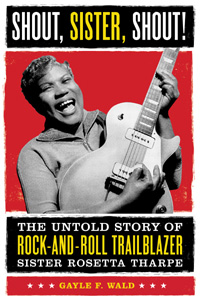Guess What I'm Reading in February 2007?

Yes, as my colleague got me hooked on slide, that led to me checking out gospel, particularly Mahalia Jackson (see below) and some earlier women, and of course Sister Rosetta Tharpe. I started reading about her, and then watching some clips of her on You Tube and the next thing I know, yep. I'm hooked! Watching her do a reserved church-proper guitar windmill when Pete Townsend was still learning how to tune up, was a revelation, and listening to her play a blistering rock'n'roll solo in 1938 on the swing-gospel tune, "That's All"! was a trip. OK, this was a past-present-future Carbonist moment. George Washington University English professor Gayle Wald's long awaited book is forthcoming from Beacon Press in February of 2007. Yippee! Wald saw the same video of Tharpe playing electric guitar in front of a gospel choir (this same clip appears on a television in the French film hit Le Fabuleux destin d'Amélie Poulain/Amélie [2001]) at an academic conference and was struck dumb, and then so fascinated by Tharpe and perplexed as to why she didn't know more about her she ended up researching her and finally writing a book. Wald also wrote the liner notes to the tribute album, Shout, Sister, Shout: A Tribute to Sister Rosetta Tharpe, that was released in 2003 I'm still stunned that Tharpe, an African American woman in 1951, was the first music artist to play a stadium gig in the US. Unh-huhn, yes, yes ya'll. Wald has expressed the difficulties of writing the biography given that Tharpe passed away in 1973, as have many of her contemporaries. Still, Wald interviewed over 150 people who worked with or knew Tharpe as part of her research. Over time the book became not just the story of Tharpe, but of the gender issues faced by African American women in church culture, the divide between sacred and secular music, the "whitening" of both"country" music and the southern roots of "rock'n'roll", the ambivalent relationship of the white-run popular music industry to black women music pioneers, and the legacy of black women's traditions of gospel music performance (stage presence, vocal techniques and arrangements, physical gesturings, etc.) in rock and country music. Interestingly, a colleague is writing about this question from another perspective which led me to give voice to some parallel questions in my own work, well that and Mendi tagging me to do a book meme. Bonnie Rait and Isaac Hayes are enthusiastic about the book, as are Griel Marcus and Joan Osbourne. I'm curious to see for myself.

1 Comments:
I love the title. I was thinking, woah, she plans her reading three months in advance?
Post a Comment
<< Home